Reputation Management: Sayōnara to Sakuras and Scammers
In this installment of Reputation Management, we go beyond North American markets for a new story. It’s still about the complex world of automotive retail, but now the situation gets rather seedy in the F&I (finance and insurance) department of a chain of used car dealerships. Even worse, this company has been a household name in Japan since 1976.
In general terms, experiences in the F&I department are generally the worst part for customers on their journey to buying a vehicle. This is because you’ve already agreed on a price with the salesperson, but now have to pay/finance the vehicle, insure it, and add various warranties to minimize future cash outlays. Some items can be necessary (road hazard warranties for 20+ inch wheels) but most take us back to the F&I scene from the movie Fargo.
Transparency is almost impossible to find in an F&I office, and the Federal Trade Commission (FTC) is currently having a hard time changing that for American consumers. The same truths apply to one of the largest used car retailers in Japan, a company that you can think of as parallel to Carmax here in the United States.
This particular Japanese F&I scandal stems from the unmitigated greed of senior management and collusion with a very large insurance provider. The former centers around damaging and/or padding the repair bill of vehicles with a warranty policy. While some insurance companies balked at the charges, one of them was seemingly okay with this troubling behavior. In return, the F&I departments agreed to only sell warranties from this particular insurance company. The end result was a massive fraud, and Japanese citizens were the victims, as they ultimately paid the tab via higher premiums.
The insurance provider in question has a CEO who is resigning by the end of this month, while the retailer’s nepotistic management team said sayōnara back in 2023. These changes happened for good reason, as Japan’s Fair Trade Commission (also FTC!) reportedly noted “violations on an unheard-of scale” by the auto retailer.
After this informative video hit YouTube, there was news this company might have a brighter future in the long term. Considering its decades of history with Japanese consumers, perhaps the relationship is salvageable.
For now, we can read the reviews like tea leaves to evaluate the short-term prospects of the company. So let’s scan Google Maps and learn a thing or two about poor retailing practices from the land of some of the world’s most trusted automotive brands.
Sakuras in Plain Sight
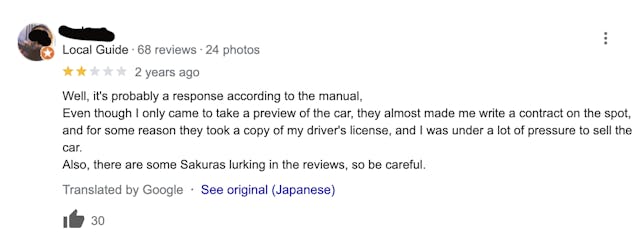
The word “sakura” means cherry blossom, which is the flower that even we Yanks appreciate around the country come springtime. But it is also a slang term for a fake customer who blends in with the general public. Sakuras are a bad sign, perhaps even worse than this high-pressure tactic to get a would-be customer into the F&I department to close the deal.

The world of online reviews can be harsh when sakuras are spotted. This might be a revenge review (my own term I just made up) to the widespread (seemingly global) practice of paying for good reviews. Doing so improves your ranking on Google Maps, and gives customers more trust in your business. The sakura industry is so big there are websites boldly proclaiming to produce good ratings for your business, but as the YouTube video above explains, this company’s sakuras were likely created in-house.

That is absolutely not strange, as fake reviews are usually from singular accounts made by employees, friends, family, etc. This retailer was in the news when this review was published, so this reviewer is clearly being sarcastic. I wonder if Google Translate softened the blow when it comes to the original tone of this review.
Tree Controversy

At the alleged behest of the CEO’s son, this company poisoned trees so motorists could see its inventory on the lot. See below—there are now tiny bushes where the stumps lie, and just a single tree stands next to the showroom.
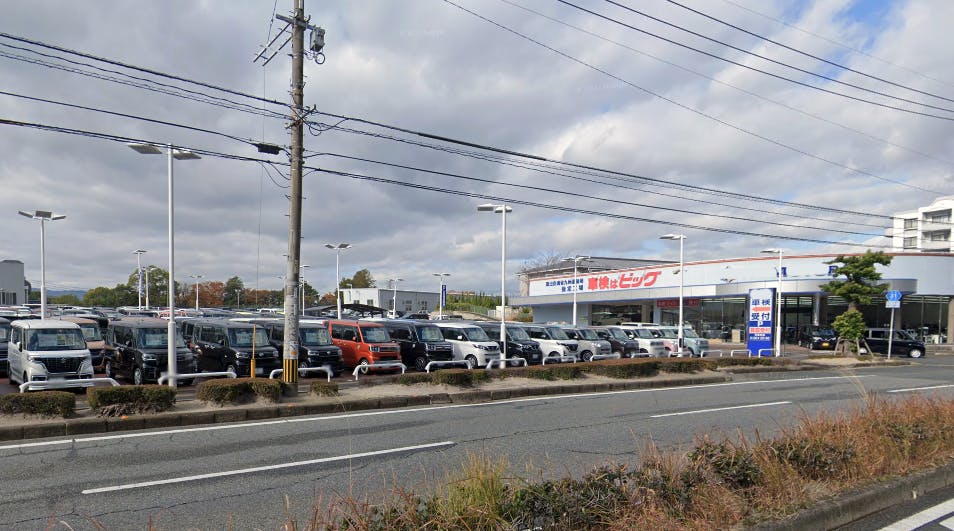
This is why being a store manager (a general manager in the U.S.) is a tough gig: You need free advertising to ensure that everyone knows you both exist and that you have cars that people want. But do you kill trees to make it happen?
A seasoned general manager knows that their store’s actions can raise the ire of locals, and killing trees gets the media and the government involved (usually in that order). Apparently that’s not an issue for this company, because they’ve blurred the lines between right and wrong elsewhere. Why not commit a little herbicide in the process?
About That F&I Fraud

Here’s an example of the counterpoint to a sakura: a revenge review that may or may not have any grounding in an actual experience at the dealership.

This comment about the fraud points to a harsh reality about the car business. No matter how sketchy the operation may be, people still need to search locally for car dealerships in their area. And a company with such a storied (as it were) history is still marketing its vehicles to locals, dangling a lure that is both tempting and necessary for many citizens.
One Bad Apple?
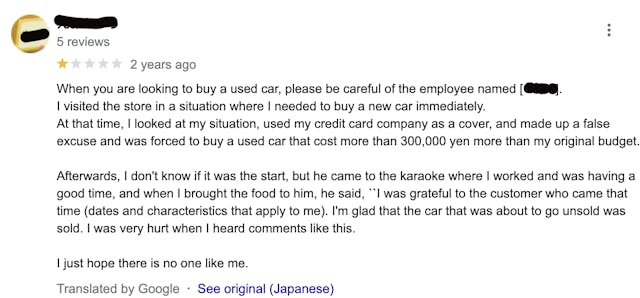
A vehicle is a necessity for many citizens, indeed. Being in a hurry to buy a new car is a recipe for getting a bad deal, because there’s a level of urgency that hurts your negotiation strategy.
But it’s a whole ‘nother ball of wax when your salesperson shows up at your workplace, expressing appreciation for your buying a car that was likely headed to auction. Hopefully this salesperson was at least a good tipper at the karaoke bar.
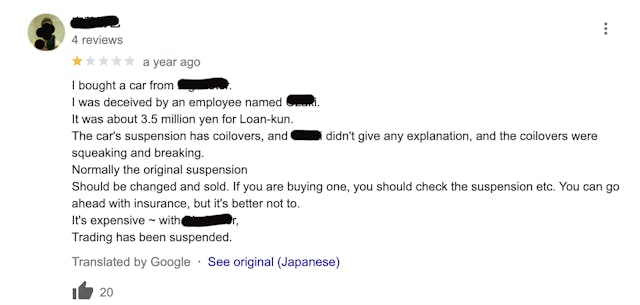
Hey, it’s the same salesperson in the previous review! Looks like the F&I fraud, stemming from overcharging an insurance company for repairs, has now manifested itself in poorly installed (or poor quality?) aftermarket coilover shocks on one of their vehicles in inventory. I suspect aftermarket parts are the bane of any insurer, so this was likely an easy rug to pull out from underneath any insurance company … not just the one you’re getting a quid pro quo from.
The Whole Thing Stinks

The YouTube explainer video above suggests that employee turnover was high because of aggressive goals set by the company. You can expect that seasoned automotive retailers will take jobs with better car dealers, or find sales positions in another industry. I suspect I’m not the first person to tell you that younger, inexperienced employees put up with more rubbish from senior management than older, tenured staff. The same truth applies to this dealership.
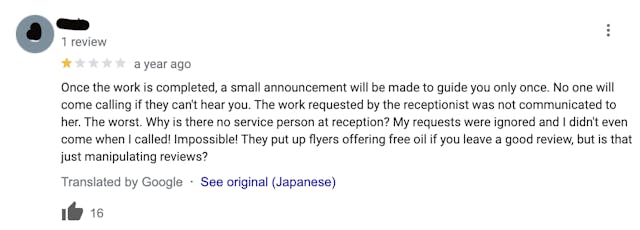
Premium car dealerships often task staff members with the sole purpose of customer support. That’s unlikely for cheaper brands, or for a used-car dealership like this one. The last sentence is also telling, as who wouldn’t want a free oil change just for leaving a Google review? That’s technically not the same as planting a sakura, but it accomplishes the same thing for the cost of oil, filter, and a little bit of labor.

The age of this review is telling, as sloppy accounting for these repairs happened well before this company’s chickens came home to roost.
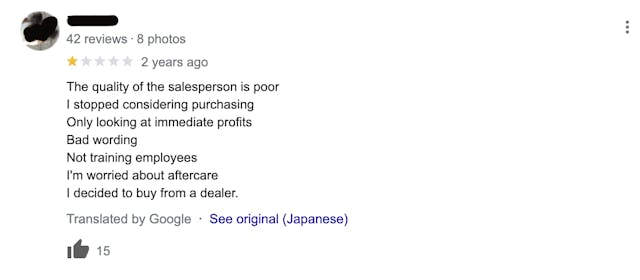
Not every customer is desperate, unsophisticated, or technically ignorant of the differences between a good and a bad purchase experience. This individual is clearly one of those lucky customers. But we don’t all get to buy from a Lexus dealership or even a reputable Chevrolet one. And we can’t all buy a one-price Tesla or anything we want from Carvana, though avoiding the tech company business model might be a good thing. (For reasons here, here, and here.)
Those who grew up in a family with no other alternatives than the buy-here-pay-here lots may not know any better. It’s a sad reality I learned head-on when I volunteered at a local high school, and when I taught middle-school-aged kids about F&I for a fintech startup company. I have no knowledge of automotive retailing in Japan, but I assume a similar issue swirls above Japanese society and this embattled automotive retailer.
No matter your circumstances, getting scammed by a sales or service department should never be allowed. Profit is one thing, but doing so at the expense of society is another. While that’s generally a gray area, this episode of Reputation Management suggests that fraud can also be crystal-clear.
***
Check out the Hagerty Media homepage so you don’t miss a single story, or better yet, bookmark it. To get our best stories delivered right to your inbox, subscribe to our newsletters.
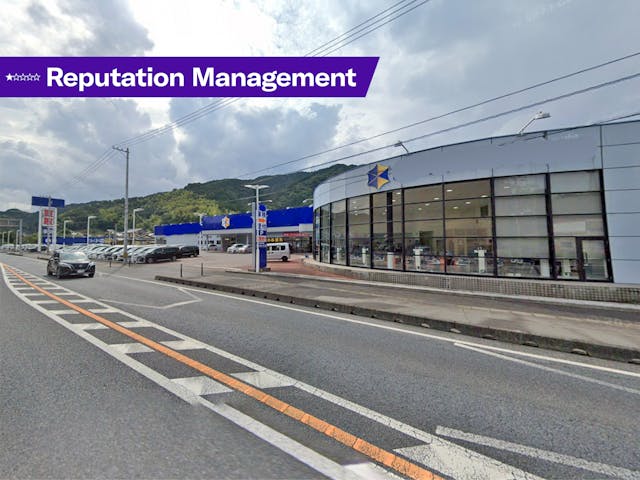

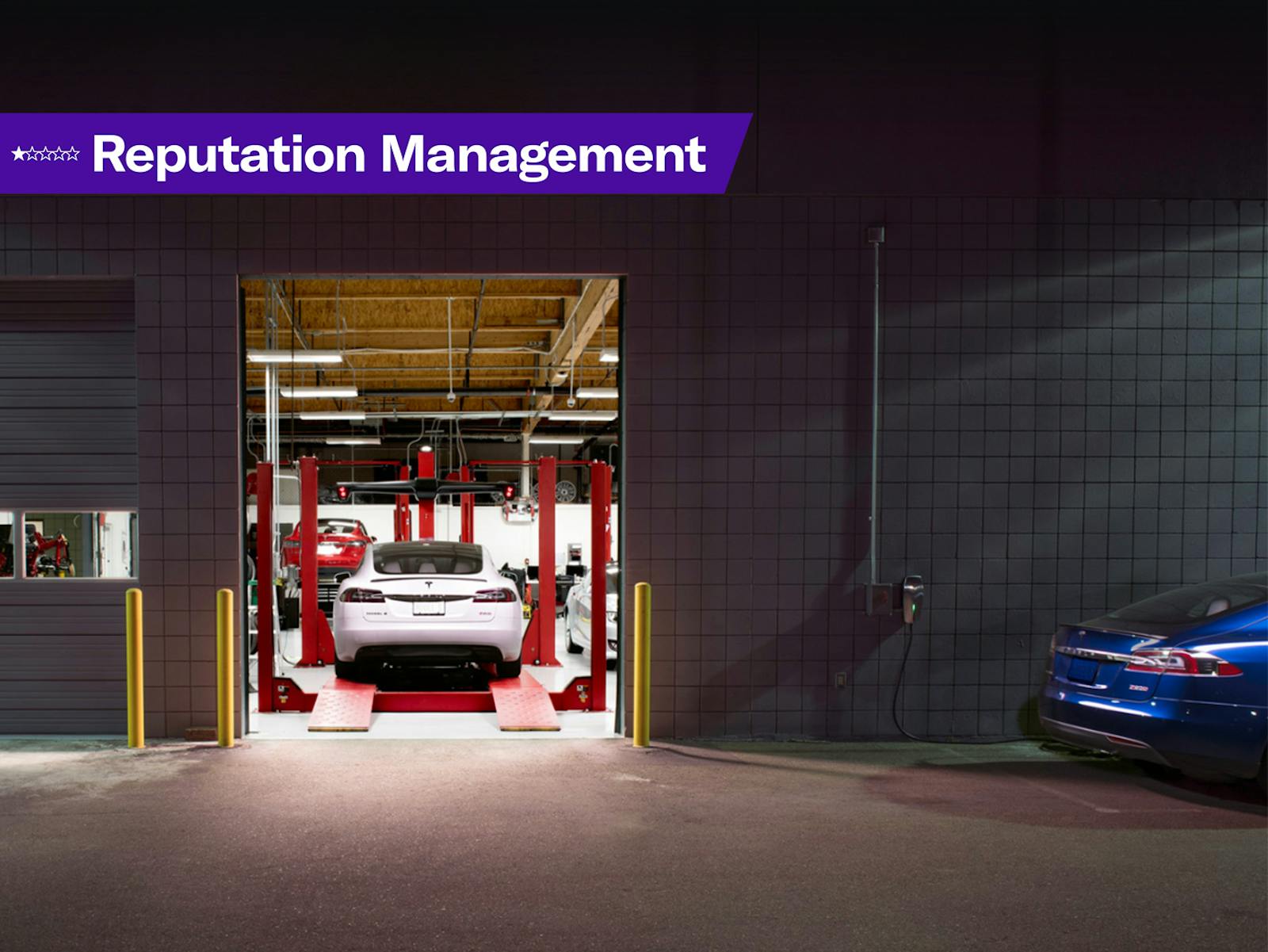
Car scams are global.
The best way to fight these things is not government but education. People go into these high priced purchases not knowing what they are buying, Not knowing what to pay and Not knowing what to say no to.
The sad thing is with the web all the answers are there today and you can learn from many videos what to do and avoid.
You get what you deserve if you do not do the home work. I have had to buy cars fast but did put in the needed time to get up to date on what I should do and expect.
If you get ripped off it means you did not do your due diligence.
I see people do the same on homes and that is even more scary.